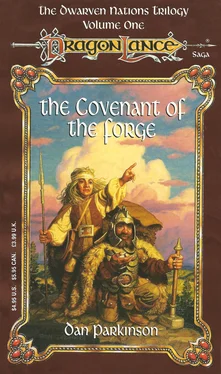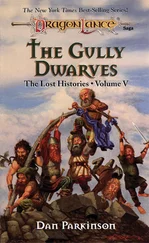Dan Parkinson - The Covenant of The Forge
Здесь есть возможность читать онлайн «Dan Parkinson - The Covenant of The Forge» весь текст электронной книги совершенно бесплатно (целиком полную версию без сокращений). В некоторых случаях можно слушать аудио, скачать через торрент в формате fb2 и присутствует краткое содержание. Жанр: Фэнтези, на английском языке. Описание произведения, (предисловие) а так же отзывы посетителей доступны на портале библиотеки ЛибКат.
- Название:The Covenant of The Forge
- Автор:
- Жанр:
- Год:неизвестен
- ISBN:нет данных
- Рейтинг книги:5 / 5. Голосов: 1
-
Избранное:Добавить в избранное
- Отзывы:
-
Ваша оценка:
- 100
- 1
- 2
- 3
- 4
- 5
The Covenant of The Forge: краткое содержание, описание и аннотация
Предлагаем к чтению аннотацию, описание, краткое содержание или предисловие (зависит от того, что написал сам автор книги «The Covenant of The Forge»). Если вы не нашли необходимую информацию о книге — напишите в комментариях, мы постараемся отыскать её.
The Covenant of The Forge — читать онлайн бесплатно полную книгу (весь текст) целиком
Ниже представлен текст книги, разбитый по страницам. Система сохранения места последней прочитанной страницы, позволяет с удобством читать онлайн бесплатно книгу «The Covenant of The Forge», без необходимости каждый раз заново искать на чём Вы остановились. Поставьте закладку, и сможете в любой момент перейти на страницу, на которой закончили чтение.
Интервал:
Закладка:
Dan Parkinson
The Covenant of The Forge
Prologue
Except for the dragons, who sprang from the world itself, the first people of Krynn were the elves. This was a conclusion reached by Mistral Thrax early in his search for certainties among the complexities of an uncertain world.
Few would recall his early pronouncements regarding the sequence of origins, because in those days Mistral Thrax was considered to be full of strong ale and vagaries, and because few among the people of the high mountains really cared about such things as who came first and why. Such thoughts were for the very old, who had nothing better to do than think them. Even then, when he began his studies of lore after being maimed in a rockfall, Mistral Thrax was more than two hundred years of age.
Thus little note was made of his reckonings. But the logic of his conclusions satisfied Mistral Thrax and led him onward in his studies.
The elves, he believed, were the first attempts of the gods — particularly of Reorx the Life-Giver — to create people of their own design upon the world which before that time had only its own creatures, the dragons, and the animals which were their prey.
So the gods discussed it and created the elves. The elves were beautiful, Mistral Thrax admitted, in an elvish way, but it was his belief that the gods grew disappointed after a time because the elves — being elves — were essentially decorative but not particularly functional. They were content simply to live long lives and to exist. They did nothing of real value, in the opinion of Mistral Thrax. In all his studies, the old dwarf found only one thing that the elves had done that was worthy of note. They had claimed the forests of Silvanesti as their home, thereby upsetting the dragons, many of whom considered Silvanesti as their own.
This, according to Mistral Thrax, was why so much of history was punctuated by periodic skirmishes and at least one full-scale war, starting with dragon attacks against the elves.
In their concern for proper balance, the gods tried again. This time, they created the ogres. And again, as time passed, they grew disappointed. The ogres had been a promising race — though unimaginative and boring — but with time they began to deteriorate in their culture and eventually they became the ogres of the present — great sullen, surly brutes who were at best a nuisance and could be a real threat.
Various gods, Mistral Thrax decided, had then tried their hands at designing a better kind of people. Which gods might have originated such monstrosities as goblins and minotaurs and the like was a question Mistral Thrax ignored, on the assumption that those particular gods were probably ashamed of what they had done, and it was not his business to lay blame.
But Reorx the Life-Giver seemed to have recognized the problems besetting his world and turned his full attention to designing the perfect race of people. As Mistral Thrax viewed it, Reorx must have created humans next, using the basic model of the elves but instilling within the new creatures great energies, driven by the realization of short life spans. Again, in Mistral’s opinion, it was a good try but not yet perfect. Humans proved to be far too chaotic a race for Reorx’s taste, he was sure, and somehow even managed to so distort their basic strengths that some of them turned into gnomes and, possibly, even kender (though there was some evidence, Mistral conceded, that kender might have originated from some unexpected deviation among the elves).
His intention and his vow — in his two hundredth year — had been to devote the rest of his life to the study of lore. Thus, a hundred years later, being still alive, he was still at it. Copious armloads of scrolls did Mistral Thrax produce through those years, dwelling on the mysteries of the world and dealing with them one by one, using good, dwarven logic. But the thread through all of his theories was that Reorx, once determined to create the proper race of people, did not stop trying until he had done so.
The true race — the masterpiece of the life-giver — was all that any god could have wanted in a chosen people. Not as tall and awkward as humans, and neither as short-lived as humans nor as indecently long-lived as elves, the new race was equipped with all the skills people needed. They made fine tools and excelled in using them. Sturdy and strong of limb, they could hew stone as other races might hew soft wood. They had the imagination and inventiveness that ogres lacked, the sense of progress and stubborn determination that elves lacked, and the continuity of purpose that humans lacked.
Through trial and error, Reorx in his wisdom had finally created the proper people for the world of Krynn — the race of dwarves. Legends held that Reorx was so pleased with his best people that, originally, he named them all Smith, though that proved so confusing that they gave themselves other personal names as needed, and eventually none of them — so far as Mistral Thrax knew — were named Smith.
Thus did Mistral Thrax clarify the origin of the dwarven race, for any who cared to consider it.
From there, being now more than three hundred years old and still alive, he went on to summarize the history of the world to date.
The dwarves in the early times had scattered over the face of the land, seeking the highest places, and tribes had become separated. There were legends of a place called Kal-Thax, where many had settled, and maybe other such places as well, but the dwarves of Mistral Thrax’s acquaintance — the Calnar — had all wound up in the realm of Thorin and had been there for a very long time.
Fact and legend became very confused on many points, but some things were clear:
— The race of humans had spread and multiplied until no one knew who or where they all were.
— The race of elves had clung to the forests of Silvanesti through a dozen dragon sieges and one full-scale war, though some elves had migrated to the west and now lived somewhere else.
— There were still ogres here and there, including a large colony to the south of Thorin, at a place called Bloten. The original architecture of Thorin was of ogre design, but had been abandoned long ago, and after a few skirmishes with the Calnar, the ogres tended nowadays to leave the dwarves alone.
— And somewhere in the now-distant past — at least four hundred years ago, by the reckoning of Mistral Thrax — magic had been introduced upon Krynn. Some said that Reorx himself had done it, led astray by other gods. Some said magic came in the form of a gray gemstone that descended upon the world and was captured for a time by humans, then released by gnomes. There was even a legend of a brave and tragic dwarven fisherman who had stood in the path of the source of magic and had tried to stop it by knocking it down with his spear.
But wherever it came from, magic had come upon Krynn, and for the dwarves it was the ultimate abomination — a power without logic, a force without the rational, comfortable rules of stone and metal, light and dark, moons and mountains, and the rhythm of hammers and drums.
The dwarves wanted no part of magic, and they ignored it. But its effects were felt.
This latest dragon war in distant Silvanesti, for example, was far worse than the any of the previous disputes there. This time, the dragons had attacked using magic, and the results were widespread. Little was known in Thorin about the war itself, except that as the elves clung to their forest and fought back, the war spread to other realms. Everywhere now, throughout the known lands, great migrations were under way, and the dwarves and their neighbors were much concerned. Evil was afoot, and everyone knew it.
Читать дальшеИнтервал:
Закладка:
Похожие книги на «The Covenant of The Forge»
Представляем Вашему вниманию похожие книги на «The Covenant of The Forge» списком для выбора. Мы отобрали схожую по названию и смыслу литературу в надежде предоставить читателям больше вариантов отыскать новые, интересные, ещё непрочитанные произведения.
Обсуждение, отзывы о книге «The Covenant of The Forge» и просто собственные мнения читателей. Оставьте ваши комментарии, напишите, что Вы думаете о произведении, его смысле или главных героях. Укажите что конкретно понравилось, а что нет, и почему Вы так считаете.












